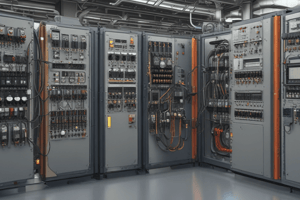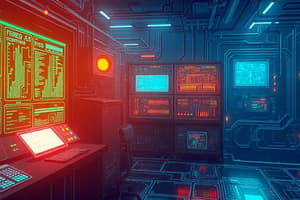Podcast
Questions and Answers
Which of the following is NOT a type of proximity sensor?
Which of the following is NOT a type of proximity sensor?
- Thermal (correct)
- Inductive
- Optical
- Capacitive
What is the main difference between a shielded and a non-shielded proximity sensor?
What is the main difference between a shielded and a non-shielded proximity sensor?
- Non-shielded sensors are more expensive than shielded sensors.
- Shielded sensors can detect objects regardless of their material, while non-shielded sensors can only detect metals.
- Shielded sensors are more resistant to interference from external factors, such as magnetic fields. (correct)
- Non-shielded sensors have a longer detection range than shielded sensors.
What type of signal does a sensor typically generate?
What type of signal does a sensor typically generate?
- Discrete or analog (correct)
- Ultrasonic waves
- Radio waves
- Mechanical signals
Which of the following is an example of a field instrument?
Which of the following is an example of a field instrument?
Which of the following is NOT a type of control hardware used in automation systems?
Which of the following is NOT a type of control hardware used in automation systems?
What is the main purpose of a control software?
What is the main purpose of a control software?
Which of these is a control software used by Allen Bradley?
Which of these is a control software used by Allen Bradley?
What is the function of an actuator in an automation system?
What is the function of an actuator in an automation system?
What is the key advantage of using a capacitive proximity sensor?
What is the key advantage of using a capacitive proximity sensor?
What is the function of a PID controller in an automation system?
What is the function of a PID controller in an automation system?
Which control method primarily relies on human operators for process control?
Which control method primarily relies on human operators for process control?
Which control method utilizes pneumatic valves and relays as the primary means of control?
Which control method utilizes pneumatic valves and relays as the primary means of control?
What control method utilizes contactors, relays, timers, and counters to achieve automation?
What control method utilizes contactors, relays, timers, and counters to achieve automation?
Which control method utilizes logic gates, replacing relays and contactors in control circuits?
Which control method utilizes logic gates, replacing relays and contactors in control circuits?
Which control method represents a significant shift in automation, using software programming instead of physical wiring?
Which control method represents a significant shift in automation, using software programming instead of physical wiring?
What technological advancement marked the beginning of pneumatic controllers and industrial automation?
What technological advancement marked the beginning of pneumatic controllers and industrial automation?
The rise of electronic logic gates in the 1960s led to the replacement of which components?
The rise of electronic logic gates in the 1960s led to the replacement of which components?
Which component replaced hardware timers and counters in control circuits with the advent of electronics?
Which component replaced hardware timers and counters in control circuits with the advent of electronics?
The development of programmable logic controllers (PLCs) was primarily driven by which technological advancement?
The development of programmable logic controllers (PLCs) was primarily driven by which technological advancement?
PLC programming enables the control and automation of processes through which means?
PLC programming enables the control and automation of processes through which means?
Which type of sensor is best suited for measuring the amount of liquid in a tank?
Which type of sensor is best suited for measuring the amount of liquid in a tank?
What is the primary purpose of a solenoid?
What is the primary purpose of a solenoid?
Which type of actuator is driven by hydraulic fluid pressure?
Which type of actuator is driven by hydraulic fluid pressure?
What type of motor is commonly used in applications that require precise and controlled movements, such as robotics?
What type of motor is commonly used in applications that require precise and controlled movements, such as robotics?
What type of sensor can be used to measure the speed of air flowing through a ventilation duct?
What type of sensor can be used to measure the speed of air flowing through a ventilation duct?
Which type of actuator is commonly used in automated systems to open and close valves?
Which type of actuator is commonly used in automated systems to open and close valves?
What is the main function of a through-beam sensor in an industrial automation application?
What is the main function of a through-beam sensor in an industrial automation application?
What type of sensor is used to measure the distance to a target by bouncing sound waves off it?
What type of sensor is used to measure the distance to a target by bouncing sound waves off it?
Which of the following is NOT a type of electrical actuator?
Which of the following is NOT a type of electrical actuator?
What is the difference between a DC servomotor and an AC motor?
What is the difference between a DC servomotor and an AC motor?
What is the purpose of the Sensor Face in a Capacitive Proximity Sensor?
What is the purpose of the Sensor Face in a Capacitive Proximity Sensor?
What is the difference between a Reflex Sensor and a Diffuse Sensor?
What is the difference between a Reflex Sensor and a Diffuse Sensor?
Which type of photoelectric sensor is best suited for detecting a transparent object?
Which type of photoelectric sensor is best suited for detecting a transparent object?
Which of the following is NOT a component of a Capacitive Proximity Sensor?
Which of the following is NOT a component of a Capacitive Proximity Sensor?
Which type of photoelectric sensor is most likely used to detect a small, moving object on a conveyor belt?
Which type of photoelectric sensor is most likely used to detect a small, moving object on a conveyor belt?
Why is a Retro-Reflective sensor called Retro-Reflective?
Why is a Retro-Reflective sensor called Retro-Reflective?
What is the purpose of the Sensing Range of a Capacitive Proximity Sensor?
What is the purpose of the Sensing Range of a Capacitive Proximity Sensor?
Which type of photoelectric sensor is typically used to detect the presence of a large, stationary object?
Which type of photoelectric sensor is typically used to detect the presence of a large, stationary object?
What is the primary difference between a Through-beam sensor and a Reflex sensor?
What is the primary difference between a Through-beam sensor and a Reflex sensor?
What is the function of the Transmitter in a Photoelectric sensor?
What is the function of the Transmitter in a Photoelectric sensor?
Flashcards
Manual Control
Manual Control
Control where operators directly manage the process.
Pneumatic Control
Pneumatic Control
Control using pneumatic valves manipulated by relays.
Hardwired Logic Control
Hardwired Logic Control
Automation using contactors, relays, timers, and counters.
Electronic Logic Gates Control
Electronic Logic Gates Control
Signup and view all the flashcards
Programmable Logic Controller (PLC)
Programmable Logic Controller (PLC)
Signup and view all the flashcards
History of Automation
History of Automation
Signup and view all the flashcards
Microprocessor Impact
Microprocessor Impact
Signup and view all the flashcards
Software vs Hardware
Software vs Hardware
Signup and view all the flashcards
Importance of Logic Gates
Importance of Logic Gates
Signup and view all the flashcards
Industrial Automation Origin
Industrial Automation Origin
Signup and view all the flashcards
Field Instruments
Field Instruments
Signup and view all the flashcards
Sensors
Sensors
Signup and view all the flashcards
Actuators
Actuators
Signup and view all the flashcards
Discrete Signal
Discrete Signal
Signup and view all the flashcards
Analog Signal
Analog Signal
Signup and view all the flashcards
Proximity Sensor
Proximity Sensor
Signup and view all the flashcards
Inductive Proximity Sensor
Inductive Proximity Sensor
Signup and view all the flashcards
Capacitive Proximity Sensor
Capacitive Proximity Sensor
Signup and view all the flashcards
Types of Proximity Sensors
Types of Proximity Sensors
Signup and view all the flashcards
PID Controller
PID Controller
Signup and view all the flashcards
Through-beam Sensor
Through-beam Sensor
Signup and view all the flashcards
Temperature Sensor
Temperature Sensor
Signup and view all the flashcards
Pressure Sensor
Pressure Sensor
Signup and view all the flashcards
Level Sensor
Level Sensor
Signup and view all the flashcards
Ultrasonic Sensor
Ultrasonic Sensor
Signup and view all the flashcards
Flow Sensor
Flow Sensor
Signup and view all the flashcards
Electrical Actuators
Electrical Actuators
Signup and view all the flashcards
DC Servomotor
DC Servomotor
Signup and view all the flashcards
Solenoid
Solenoid
Signup and view all the flashcards
Indicator Light
Indicator Light
Signup and view all the flashcards
Photoelectric Sensor
Photoelectric Sensor
Signup and view all the flashcards
Reflex Sensor
Reflex Sensor
Signup and view all the flashcards
Diffuse Sensor
Diffuse Sensor
Signup and view all the flashcards
Transmitter (in sensors)
Transmitter (in sensors)
Signup and view all the flashcards
Receiver (in sensors)
Receiver (in sensors)
Signup and view all the flashcards
Sensing Range
Sensing Range
Signup and view all the flashcards
Retro-Reflective Sensor
Retro-Reflective Sensor
Signup and view all the flashcards
Study Notes
Programmable Logic Controller (PLC)
- PLC is a digital computer used for automation of electromechanical processes
- PLCs use programs to control machinery
- Replaced relay and auxiliary contactors in control systems
- PLCs use software instead of physical wiring
- The advent of microprocessors and peripheral chips in the 1970s brought major changes to control and automation
Types of Control
- Manual Control: All process control actions are performed by an operator
- Pneumatic Control: Uses valves controlled by relays and switches. Originated in the 1920s
- Hardwired Logic Control: Uses contactors and relays with timers and counters for automation
- Electronic Logic Gates Control: Uses logic gates to replace relays in control systems (1960s)
- Programmable Logic Controller (PLC): Uses software to control machinery with microprocessors
Field Instruments
- Sensors: Detect and react to physical influences (e.g., heat, light, pressure) and produce corresponding signals
- Types: Proximity, inductive, capacitive, photoelectric, reflex, diffuse, trough beam, temperature, pressure, level, ultrasonic, flow
- Actuators: Hardware devices converting controller signals to physical changes
- Types: electrical motors (DC and AC servomotors, stepper motors), solenoids, hydraulic actuators, pneumatic actuators
Proximity Sensors
- Detects nearby objects without physical contact
- Inductive Proximity Sensors: Detect metallic objects
- Capacitive Proximity Sensors: Detect various solid, liquid, metal, or non-metal targets without physical contact.
Types of Proximity Sensors
- Shielded: Protects the sensor from external interference.
- Non-shielded: Less expensive but less protected
Sensor Components
- Indicator light, sensor body, sensor face, power cable, sensing range
Sensor Applications
- Can presence/counting detection, security metal detectors
Capacitive Proximity Sensor Components
- Indicator light, sensor body, sensor face, power cable, sensing range
Sensor Wiring
- Pre-wired and plugged-in types
Photoelectric Sensors
- Detect objects using infrared light
- Types: Reflex and diffuse
Reflex Sensor
- Emits and receives light back from reflectors
- Measures object presence by cutting the reflective beam
Diffuse Sensor
- Emits and receives light over a set distance to detect targets within that area
- Detects product in a pre-set range
Through-beam Sensor
- Emits light from a sender and evaluates whether the beam is obstructed by receiver
- Measures distance or object presence
Temperature Sensors
- Measure temperature and output the signal (e.g., electrical)
Pressure Sensors
- Measures pressure and provide electrical output
Level Sensors
- Measures fluid or granular materials' level
Ultrasonic Sensors
- Measure distance using high-frequency sound waves
Flow Sensors
- Measure the rate of a liquid or gas through a pipe or conduit
Actuators
- Convert controller signals into physical changes in machinery. Use different energy sources. (e.g., electric current, hydraulic fluid pressure, pneumatic pressure).
Types of Actuators
- Electrical Actuators
- Electric Motors
- DC Servomotors
- AC motor
- Stepper motor
- Solenoids
- Electric Motors
- Hydraulic Actuators
- Pneumatic Actuators
Solenoid Relays
- Electrically operated switch using electromagnets mechanically activating a switch.
Detailed Actuator Information
- Solenoid*
- Electromechanical device using a coil to produce magnetic fields when current passes
- Electric Actuators*
- Electric current or voltage powers these, which includes DC/AC servomotors, stepper motors, etc., to produce mechanical movement.
- Hydraulic Actuators*
- Pressurized fluids power these.
- Pneumatic Actuators*
- Compressed air runs these.
Studying That Suits You
Use AI to generate personalized quizzes and flashcards to suit your learning preferences.





